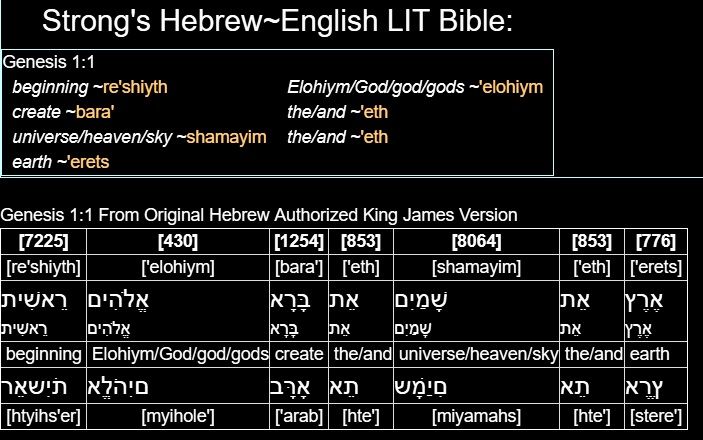| [1161] | [2036] | [4314] | [3101] | [2250] | [2064] | [3753] | [1937] | [1492] | [3391] | [2250] | [5207] | [444] | [2532] | [3700] | [3756] | [3700] |
|---|---|---|---|---|---|---|---|---|---|---|---|---|---|---|---|---|
| [de] | [epo] | [pros] | [mathetes] | [hemera] | [erchomai] | [hote] | [epithumeo] | [eido] | [mia] | [hemera] | [huios] | [anthropos] | [kai] | [optanomai] | [ou] | [optanomai] |
| δέ | ἔπω | πρός | μαθητής | ἡμέρα | ἔρχομαι | ὅτε | ἐπιθυμέω | εἴδω | μία | ἡμέρα | υἱός | ἄνθρωπος | καί | ὀπτάνομαι | οὐ | ὀπτάνομαι |
| also, and, but, moreover, now | answer, bid, bring word, call, command.. | about, according to , against, among, .. | disciple | age, + alway, (mid-)day (by day), dail.. | accompany, appear, bring, come, enter,.. | after (that), as soon as, that, when, .. | covet, desire, would fain, lust (after | be aware, behold, X can (+ not tell), .. | a (certain), + agree, first, one, X ot.. | age, + alway, (mid-)day (by day), dail.. | child, foal, son | human/people | and, also, both, but, even, for, if, o.. | appear, look, see, shew self | long, nay, neither, never, no (X man).. | appear, look, see, shew self |
| έδ | ωπἔ | ςόρπ | ςήτηθαμ | αρέμἡ | ιαμοχρἔ | ετὅ | ωέμυθιπἐ | ωδἴε | αίμ | αρέμἡ | ςόἱυ | ςοπωρθνἄ | ίακ | ιαμονάτπὀ | ὐο | ιαμονάτπὀ |
| [ed] | [ope] | [sorp] | [setehtam] | [aremeh] | [iamohcre] | [etoh] | [oemuhtipe] | [odie] | [aim] | [aremeh] | [soiuh] | [soporhtna] | [iak] | [iamonatpo] | [uo] | [iamonatpo] |
Luke17:22 From Original Authorized King James VersionLuke 17:22 And he said unto the disciples, The days will come, when ye shall desire to see one of the days of the Son of man, and ye shall not see it.
Luke 17:22 And he said unto the disciples, The days will come, when ye shall desire to see one of the days of the Son of man, and ye shall not see it.
Luke17:22 Strong's Greek~English LIT Bible:
Luke 17:22
also, and, but, moreover, now ~de
answer, bid, bring word, call, command.. ~epo
about, according to , against, among, .. ~pros
disciple ~mathetes
age, + alway, (mid-)day (by day), dail.. ~hemera
accompany, appear, bring, come, enter,.. ~erchomai
after (that), as soon as, that, when, .. ~hote
covet, desire, would fain, lust (after ~epithumeo
be aware, behold, X can (+ not tell), .. ~eido
a (certain), + agree, first, one, X ot.. ~mia
age, + alway, (mid-)day (by day), dail.. ~hemera
child, foal, son ~huios
human/people ~anthropos
and, also, both, but, even, for, if, o.. ~kai
appear, look, see, shew self ~optanomai
long, nay, neither, never, no (X man).. ~ou
appear, look, see, shew self ~optanomai
Samekhi's Greek LTR-RTL Greek Hebrew Bible Project
Luke 17:22
Strong's Dictionary Number: [1161] |
Strong's Dictionary Number: [2036] |
Strong's Dictionary Number: [4314] |
Strong's Dictionary Number: [3101] |
Strong's Dictionary Number: [2250] |
Strong's Dictionary Number: [2064] |
Strong's Dictionary Number: [3753] |
Strong's Dictionary Number: [1937] |
Strong's Dictionary Number: [1492] |
Strong's Dictionary Number: [3391] |
Strong's Dictionary Number: [2250] |
Strong's Dictionary Number: [5207] |
Strong's Dictionary Number: [444] |
Strong's Dictionary Number: [2532] |
Strong's Dictionary Number: [3700] |
Strong's Dictionary Number: [3756] |
Strong's Dictionary Number: [3700] |
Verses -> 1 2 3 4 5 6 7 8 9 10 11 12 13 14 15 16 17 18 19 20 21 22 23 24 25 26 27 28 29 30 31 32 33 34 35 36 37
The King James version of the Bible is Public Domain.


🌈Pride🌈 goeth before Destruction

When 🌈Pride🌈 cometh, then cometh Shame
Bible News
- The Greek Word Pharma in Revelation 18:23, Does it Refer to Big Pharma? - Thu, 07 Apr 2022 13:09:12
- If you are a country club church working out of a country club building who wants to have a Country Club Church Website... - Sat, 26 Feb 2022 20:45:41
- Gematria of the Egyptian Hieroglyphs - Fri, 25 Feb 2022 16:26:48
- Oldest Manuscript P47 shows Σ Sigma not Ξ Samekh for 60 in the 666 from Revelation 13:18 - Sun, 20 Feb 2022 09:30:56
- What does biblical “inerrancy” mean? | Richard Ostling - Patheos - Sun, 20 Feb 2022 09:29:08
- DC museum unveils rare 1,000-year-old Hebrew Bible - The Times of Israel - Fri, 18 Feb 2022 22:54:59
- Ancient Canaanite temple with statues of Baal found in southern Israel - Haaretz - Fri, 18 Feb 2022 22:53:28
- Inside the Lachish Temple, the Earliest Example of the Letter Samekh - The Daily Beast - Fri, 18 Feb 2022 22:44:02
- Israeli scholars discover corrections, erasures, revisions in oldest biblical manuscript - Haaretz - Fri, 18 Feb 2022 22:42:27
- Museum of the Bible returns hand-written gospels looted from Greece during the First World War - Art Newspaper - Fri, 18 Feb 2022 22:41:24
- Bible study: Ancient Jewish manuscript analysed using state-of-the-art cameras - Daily Mail - Fri, 18 Feb 2022 22:39:25
- Is a Long-Dismissed Forgery Actually the Oldest Known Biblical Manuscript? - The New York Times - Fri, 18 Feb 2022 22:32:39
- More Dead Sea Scrolls, second oldest Hebrew Bible manuscript, found after 60 years - ThePrint - Fri, 18 Feb 2022 22:30:23
- A Biblical Mystery and Reporting Odyssey: 1883 Fragments - The New York Times - Fri, 18 Feb 2022 22:24:46
- Lost Bible Fragment Recovered Among Dead Sea Scrolls | Lost Bible Fragment Recovered Among Dead Sea Scrolls - Patheos - Fri, 18 Feb 2022 22:14:35
- African Script Sheds Light on Evolution of Writing - DISCOVER Magazine - Fri, 18 Feb 2022 21:47:13
- Evidence of ‘biblical giants’ found in northern Israel - The Jerusalem Post - Fri, 18 Feb 2022 21:39:06
- Oldest precursor to letter S aka Samekhi was found in nine-letter Canaanite text unearthed in Israel - Fri, 18 Feb 2022 21:39:06
- In Tigray, Christianity May Be Erased - FSSPX.Actualités - FSSPX.News - Fri, 18 Feb 2022 14:12:41
- Rocket Science Confirms Biblical Creation - Answers In Genesis - Fri, 18 Feb 2022 13:28:44
.jpg)
Christian how we Support the Ministry
Industrial Electronic Repair
Industrial Monitor Repair
Power Supply Repair
ebay
Manufacture's Repaired
A B C D E F G H I J K L
M N O P Q R S T U V W X Y Z
Simple Rules for this Site!
Posted by Webmaster on Saturday, August 31 2002
- Web-Ministry is intended for the Glory of God.
- Please try to be respectful of God and to be reverent toward His Word, which is the Holy Bible.
- Some may not be Christian nor agree with Christian theology in general, but please be respectful of those that do and to Christendom in general.
- People from all walks of life and backgrounds of faith are welcome here, including the backslidden and nonbelievers, as well.
- We may not all agree... but we can agree to disagree, at least.
- However, any potential disagreements still need to remain civil in nature, and should stay as such.
- Please, just debate the points of your position, if necessary, and refrain from ad hominem attacks. Slandering and name calling serve no productive purpose.
- Posting rules are based upon decent conduct and generally acceptable chat behavior and, also, on Christian beliefs and morals found in the Holy Bible.
- Please refrain from using offensive language or obscenely suggestive innuendo.
- Usernames that are not becoming of basic common decency and morality are not to be used and may possibly result in membership cancellation.
- Refusing to follow forum rules may result in membership cancellation and possibly some or all applicable posts being deleted and if necessary... entire threads.
- If you feel these things to be unacceptable, please find another forum to post on.Thank you.
- dp,webmaster,Chrysoprasus,wilshine
Jesus Christ Forums
To the Glory of Jesus Christ!
Jesus Christ Forums Software Testing
Radio for Jesus 24/7
Hosted by $SamekhiAmI

Surplus by Samekhi
OR
Cash app $SamekhiAmI
Manufacture's Repaired
A B C D E F G H I J K L
M N O P Q R S T U V W X Y Z
Web-Ministry Created this page in 0.062267 seconds